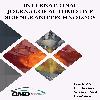Experimental Investigations on Enhancement of DME Energy Shares in Compression-Ignition Engine Under Dual Fuel Mode Using Reduced Compression Ratio
The effects of the compression ratio (CR), which was reduced from base (19:1) to (17:1), on the enhancement of Dimethyl Ether Energy Share (DME ES) and emissions reduction in a 5.5 kW DICI (direct injection compression ignition) engine are studied. The experimental tests were conducted on the engine with DME as main fuel and diesel as pilot fuel at 13 Nm torque and speed of 2200 rpm condition under dual fuel mode (DME-diesel). The maximum DME energy share (DME ES) enhanced drastically from 44% with base CR to 53% with the reduced CR. Smoke emission decreased to nearly zero levels with both CRs (19:1 and 17:1). CO and HC emissions significantly decreased with 53% of DME ES with reduced CR. NOx emission decreased drastically with the reduced CR (17:1). However, brake thermal efficiency is marginally droped with the reduced compression ratio. The combustion characteristics are discussed in detail.
Keywords:
Compression ratio, Emissions Diesel Engine, DME Energy Share, Dual Fuel Mode,
___
- Reference 1. Arcoumanis C, Bae C, Crookes R, Kinoshita E. The potential of de- methyl ether (DME) as an alternative fuel for compression-ignition engines: A review. Fuel 2008; 87: 1014-1030. https://doi.org/10.1016/j.fuel.2007.06.007 [1]
- Reference 2. Chintala V, Subramanian KA. Experimental investigations on effect of different compression ratios on enhancement of maximum hydrogen energy share in a compression ignition engine under dual-fuel mode. Energy 2015; 87: 448-462. https://doi.org/10.1016/j.energy.2015.05.014 [14]
- Yayın Aralığı: Yılda 4 Sayı
- Başlangıç: 2016
- Yayıncı: Otomotiv Mühendisleri Derneği
Sayıdaki Diğer Makaleler
Akshey Marwaha, K.A. Subramanian
Naba Kumar Mondal, Soumya Kundu, Kamalesh Sen
Shreemohan SİNHA, Anilkumar Shere, K A Subramanian
K. A. Subramanian, Nidhi Chaudhary
K. A. Subramanian, Sachin Kumar Gupta
Hüseyin Bayrakçeken, Hicri Yavuz
K. A. Subramanian, Nidhi Chaudhary
